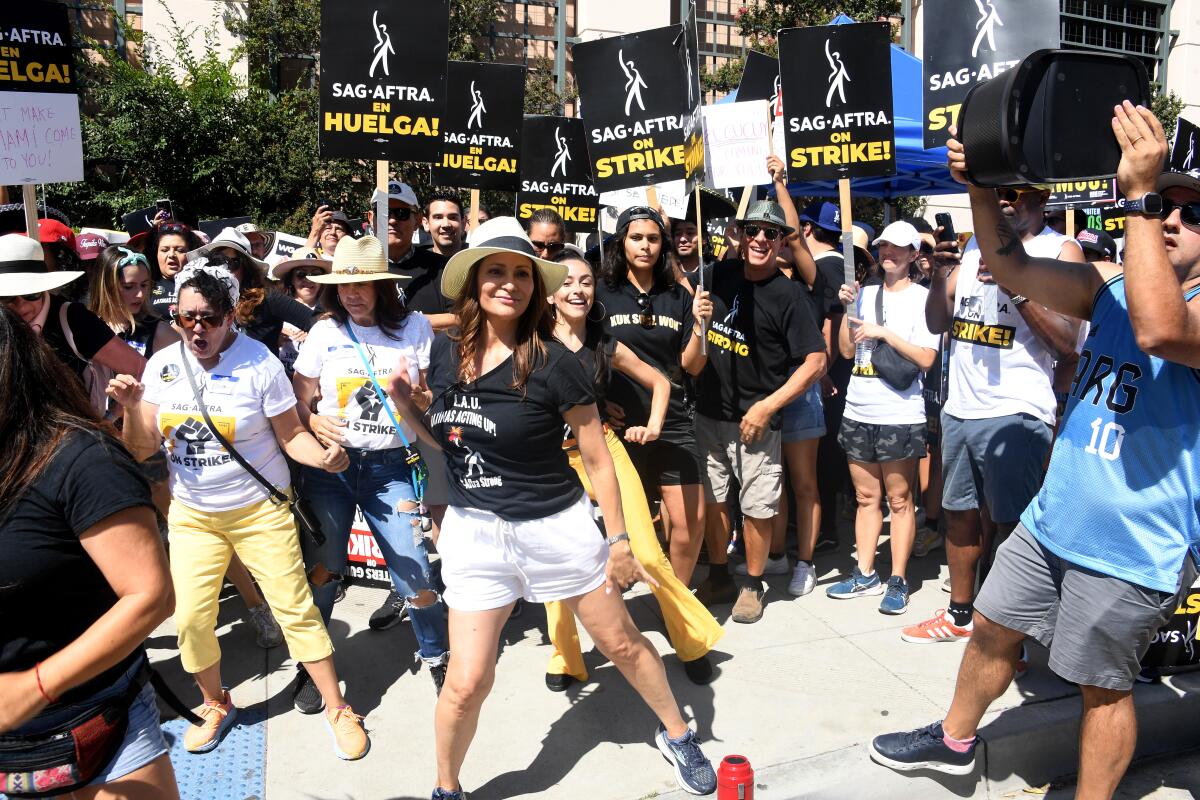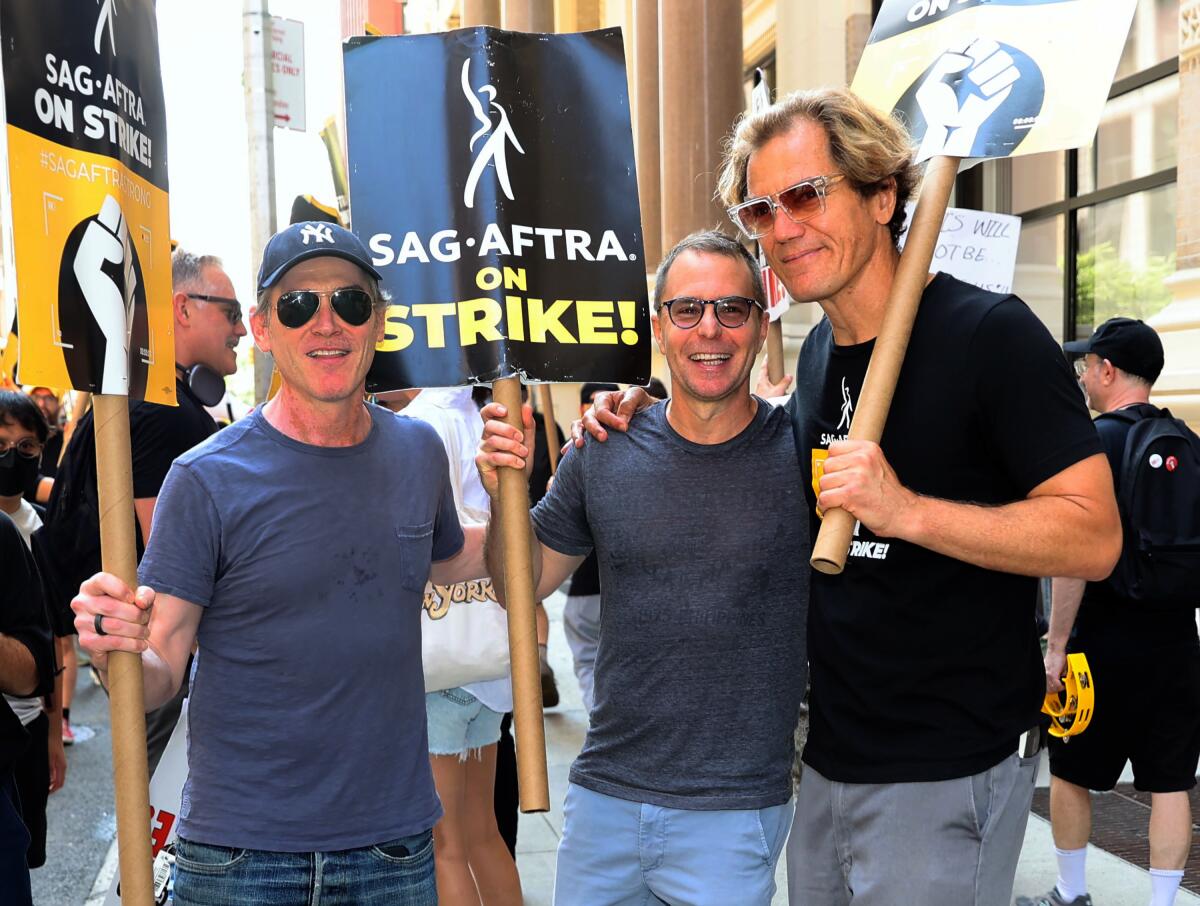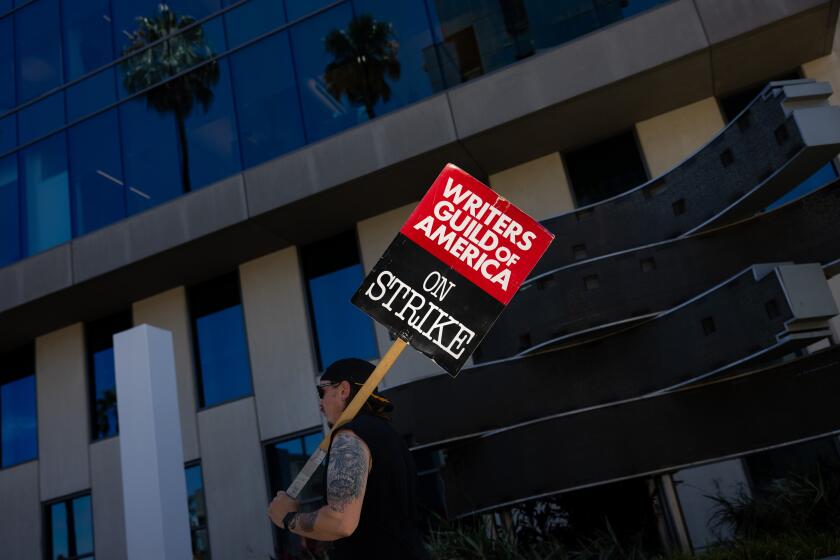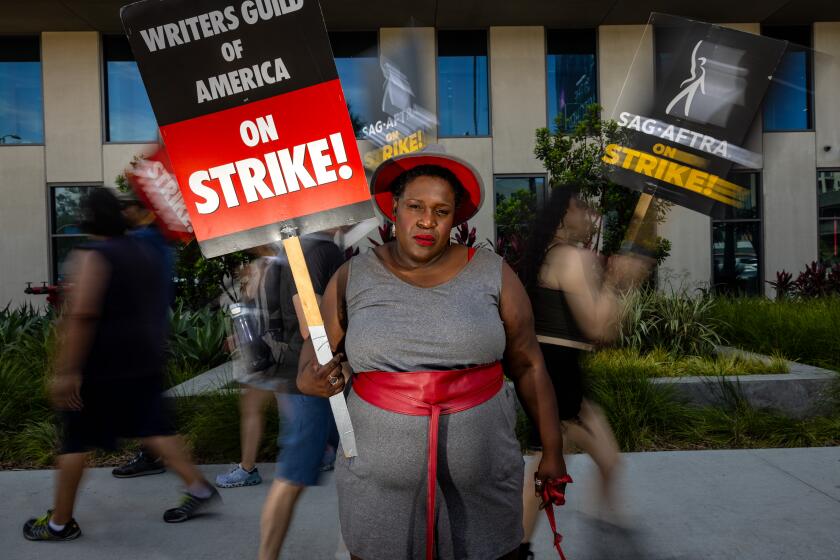A-list actors may be on strike, but you can still watch them work. Here’s how

- Share via
Friday was a busy day for Constance Marie. With a bullhorn in one hand and a sign in the other, she helped lead a flash mob on the picket line at Warner Bros. Studios, alongside the industry’s Latina writers and actors.
“None of us wants to strike, we really want to work,” Marie told The Times. “Especially for the Latino community right now, we have so many projects coming out and it’s breaking everyone’s heart to not be able to do press. But it was a magnificent gathering.”
She then went to rehearsal, where she greeted her “With Love” showrunner, Gloria Calderón Kellett, and co-stars Benito Martinez, Desmond Chiam, Isabella Gomez and Todd Grinnell.
The seasoned TV star isn’t breaking the Screen Actors Guild-American Federation of Television and Radio Artists strike against the Alliance of Motion Picture and Television Producers. But yes, she is acting. And she’s doing it for a good cause.
Despite some studio executives balking at WGA’s original demands, insiders say studios are now making concessions in a bid to end the strike. Will they be enough?
With Stephanie Beatriz, Dulé Hill and Rhea Seehorn, Marie is performing in “Best of” Snapshots, a lineup of one-act plays. Taking place Sept. 1-3 at the Pico Playhouse, the four performances are fundraisers for the Entertainment Community Fund, a charitable organization that provides emergency financial assistance, among other services, to entertainment workers.
While many are raising funds for those affected by Hollywood’s work stoppage by selling their possessions, auctioning off a private meal or just donating their millions, others like Marie are passing the summer by taking to the stage. Uzo Aduba, James Marsden, Thomas Lennon and Michael Ian Black are among those joining the Middle Aged Dad Jam Band for upcoming shows in Los Angeles and Denver.
And “Back on the Strip” comics Tiffany Haddish, Bill Bellamy, Faizon Love and Gary Owen performed at the Laugh Factory in Hollywood earlier this week — planned as just “one of many Laugh Factory fundraisers to support writers, actors and entertainment community members who are affected by the strikes,” according to the venerable comedy club.

Some pro bono performances yield benefits beyond Hollywood. Playwright and screenwriter Laura Cahill, who was casting actors for readings of work by teen Ukrainian playwrights shortly after the SAG-AFTRA strike began, was surprised to get the green light from the likes of Michael Shannon, Liev Schreiber, David Harbour, Merritt Wever and Cherry Jones. (The event, taking place Sunday at 11 a.m., is open to the public; email YoungPlaywrightsUkraine@gmail.com to request the Zoom link.)
“We were dreaming big and tried anybody we wanted to, and people said yes very quickly,” Cahill said of recruiting for the 10-minute plays. “During rehearsals, you can feel right away that the actors are being so generous and dedicated and responsive to the material. It’s very special for these young writers.”
While the actors’ voluntary participation is beneficial for the events’ respective causes, it pays back the performers tenfold.
“One of the things that happens with creativity in almost anybody is that muscles atrophy, and there’s a cost to these kinds of actions, not just in a financial sense,” says Billy Crudup, who will take the stage at New York City’s Theatre Row later this year for a benefit performance alongside Wayne Brady, Vincent D’Onofrio, Gina Gershon, Walton Goggins, Natasha Lyonne, Sam Rockwell, Daphne Rubin-Vega, Schreiber and Yul Vazquez.
These actors will be performing 10-minute “Picket Plays,” created by the founders of the Relentless Award — originally established in the name of actor Philip Seymour Hoffman — to support WGA members who are unable to work due to the current strike. (Submissions are now open to all current WGA members; the panel of judges — including Tanya Barfield, Eric Bogosian, Aleshea Harris and Lynn Nottage — will select six winning writers to receive a $10,000 grant and five finalists to receive $1,000 each.)
“When we are all in each other’s company, active with our particular skill sets and creating things together, we understand our value and it’s not put into question by somebody else,” said Crudup. “In creating this specific event in the midst of a deprivation of work, we are reminded of our requirement to be serious and relentless about our art. And that just gives you all the more impetus to strike for fair wages and long-lasting contracts for future generations.”
Four actors on why they’re striking and the struggle to maintain a middle-class living in today’s Hollywood.
Ultimately, though, actors and writers who are keeping busy while on strike are most concerned with the demands behind the stoppage. “We’re fighting this fight because we have to, not because we want to,” said Marie. “Over the last 40 to 60 years, our contracts have slowly been shaved down to a splinter, and it’s not sustainable.
“When you saw that movie about that Mattel toy, you were not looking at a blank screen or a CEO up there,” she added, in reference to “Barbie’s” historic box-office haul. “That is hundreds of hours of labor-intensive work by hundreds of people collectively trying to make something magical.”
Still, she joked, there is something familiar about acting as a charitable endeavor.
“Actors are always working. Auditions, wardrobe, hair, makeup, driving all over town — that’s just all free work to try to get work.”
More to Read
Inside the business of entertainment
The Wide Shot brings you news, analysis and insights on everything from streaming wars to production — and what it all means for the future.
You may occasionally receive promotional content from the Los Angeles Times.













